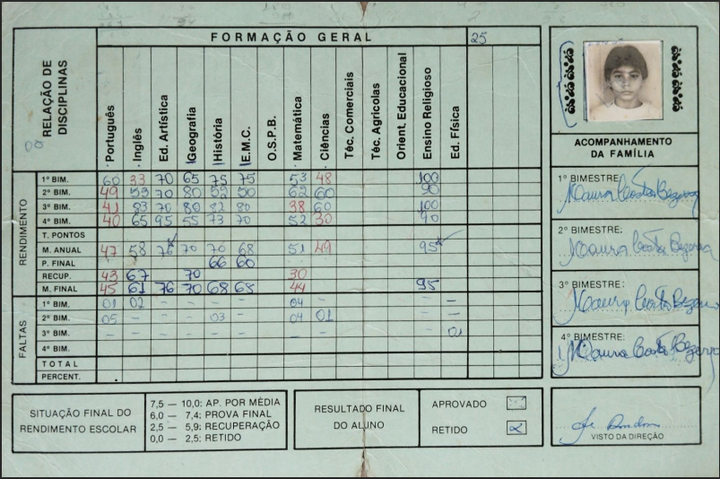
Cracking the Chess Code: How to Improve Without Reading a Single Book
Hey guys, I am Brazilian and I am 2109 FIDE classical rated. When I was a kid, I was a really bad student, the worst in my classroom. Despite this, I was the champion in my small city and school several times. I wonder why smart individuals like doctors, engineers, mathematicians, entrepreneurs, and programmers, after playing and studying for a while, get stuck below 1800 FIDE classical rating. After reading a lot about chess improvement and learning in general, I think I found the answer. By the way, the picture in the header of the article shows my grades in school. The grading system was from 0 to 10, and to succeed, you had to average at least 7.5. My situation was pretty bad.
I like to read books in general, but books about chess are too boring for me. I have never read an entire book about chess in my life, with the exception of books full of tactical problems. I know a guy in my city who has read over one hundred books about chess openings, endings, and game collections. Despite this, we are roughly at the same level. I always thought, how is this possible? That guy is pretty smart and loves to read books about chess. Why isn't he way better than me after reading so many books?
Don't misunderstand me, reading books about chess is excellent if you're capable of it. I suffer from ADHD, so it's almost impossible for me to read the detailed analyses in books. My focus drifts away within 2 or 3 minutes. I tried to read "My Great Predecessors" by Garry Kasparov, a wonderful collection, but it's not for me. I only read the history parts, and they're really fun.
You might be wondering by now, how did this guy study chess if he didn't read books about chess? I started playing chess at 15 and played for 1 or 2 years. I'm now 47, but for the majority of this time, I was away from it. There were some periods where I went two or three years without playing a single game, not even online. But despite this, I love to play chess. Maybe my ADHD can explain that, but I love to play and actively try to understand chess positions. I see a position and immediately start trying to find the best move and the best ideas from that position. This is where the secret of improvement lies: active learning.
Basically, you have to analyze instructive positions every day and really try hard to grasp the solution. After trying and possibly failing, attempt to visualize the solution without moving the pieces. This step is important to improve your chess vision. But this is just half of the training.
The second part is to acquire a chess arsenal of reusable ideas. Solving chess positions is too slow to build a big arsenal of thousands of chess ideas. You have to play games and analyze them afterward. 3 + 2 games are great for this. Analyze these games with the help of an engine and a coach, and collect these ideas for periodic revisits.
The last important thing you have to learn about chess is that chess loves repetition. Collect your arsenal of ideas, put them in a file, an app, flashcards, or whatever format suits you, and revise them dozens of times. I'll repeat: repetition is what your chess skills thrive on. Bruce Lee once said: "I am not afraid of a man who has practiced 10,000 kicks once, but I am afraid of a man who has practiced one kick 10,000 times."
One more thing: teaching helps you improve at any skill. Because of this, I will be offering chess lessons for affordable prices. If anyone is interested, please feel free to contact me on Lichess.
PS: The lessons will be personalized; I will analyze some of your games before the lesson, and we will play and analyze positions selected for you during the lessons.
